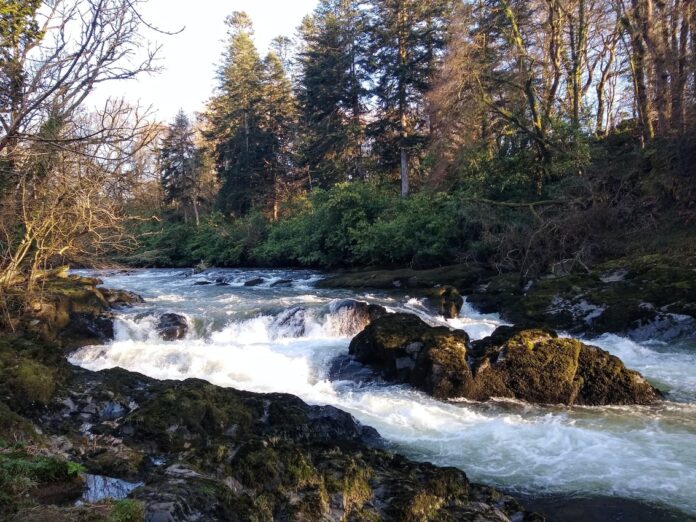“You’re calmly saying it’ll take another twenty years before the needed infrastructure is installed to then start repairing the river. The river is in trouble today. Why can’t something be done sooner?” was a question from a concerned audience member.
Last Thursday, a smaller building part of Cardigan’s Mwldan performing arts theatre held a community forum hosted by Save the Teifi. Speakers included Callum Forth – Chair of Save the Teifi – and four representatives from Welsh Water.
Finger-levelling, accusations, and the rest were peppered in amongst facts and genuine pleas to make a difference in improving the health of the Teifi.
For a host of reasons, there’s a lot in the Teifi that either shouldn’t be in the water period or are at too high levels.
Unfortunately, as was very clear throughout the evening, Welsh Water’s agenda is to bring only phosphorus levels in-line with Ofwat’s acceptable levels. Ofwat is the water services regulatory body. During the conversations, the reps admitted other forms of pollution are in the Teifi yet avoided answering any questions about removing non-phosphorus pollution.
In a roundabout way, Welsh Water admitted it’s never been good enough. During the community forum, reps told the group that Ofwat started collecting and setting maximum permissible amounts of phosphorus in waterways two years ago. And, in the two years since that data has been collected, Welsh Water’s ranking has been demoted in each of those years for not reaching Ofwat’s guidelines.
Phosphorus occurs naturally and is an essential mineral. But, its creep is hitting excess, and as with anything above moderation, problems arise.
Excessive phosphorus in water causes something called eutrophication. Algae grows rapidly because of this extra nutrition and can smell bad, block sunlight, and even release toxins. When algae die, they are decomposed by bacteria which consumes all the oxygen dissolved in the water needed by fish to survive, leading to hypoxic conditions where there is not enough oxygen for aquatic life to live, resulting in a “dead zone”.
Admittedly, some phosphorus in the water does come directly from humans – through the waste we flush and from products we use. The advice regarding toilet behaviour is the ‘three p’s’ – only pee, poo, and paper should be flushed. All else is put into the rubbish. And we can look for products with less or even no phosphorus. Many laundry, dish and car washing soaps contain a form of phosphorus called phosphates, which are carried into the water system through our drains.
Another failure the reps indirectly admitted to was when phosphorus tracking came into play. Kelly Jordan, the main speaker and target of too many negative questions from a sometimes hostile audience, is part of a group looking at how medication taken by humans and passed as waste affects the water’s health. This group was formed in 2010. Yet, it took until 2021 for Welsh Water to start monitoring phosphorus. The previously mentioned phenomenon – eutrophication – has not just started happening. It was first recognised in the 1940s.
At a previous community forum, a suggestion was made to set up an online discussion board with all stakeholders – Save the Teifi, Welsh Water, Natural Resources Wales, and concerned citizens. This group was never set up. And, when mentioned again on Thursday, it was mentioned as though it was the very first time the idea came up.
Of course, the health of the Teifi has been endangered several times in the past. The Teifi has been designated as a Site of Special Scientific Interest (SSSI) since 1997 to protect its rare and unique features and species.
Will bringing phosphorus levels in-line with Ofwats requirements revive the River Teifi? No. There are still other pollutants causing harm that Ofwat and Welsh Water are downplaying. We need a plan to bring life back to our beloved river – the 9th most polluted river in the UK and the most polluted in Wales.
As a whole, we need to understand the pollutants that are causing issues in our waters and look at reducing or eliminating all affecting pollutants.
If you’re interested, the next Save the Teifi activity is a walk from Llechryd to Poppit August 11th. Keep an eye on the Save the Teifi website or Facebook for more events.
Help keep news FREE for our readers
Supporting your local community newspaper/online news outlet is crucial now more than ever. If you believe in independent journalism, then consider making a valuable contribution by making a one-time or monthly donation. We operate in rural areas where providing unbiased news can be challenging. Read More About Supporting The West Wales Chronicle


























